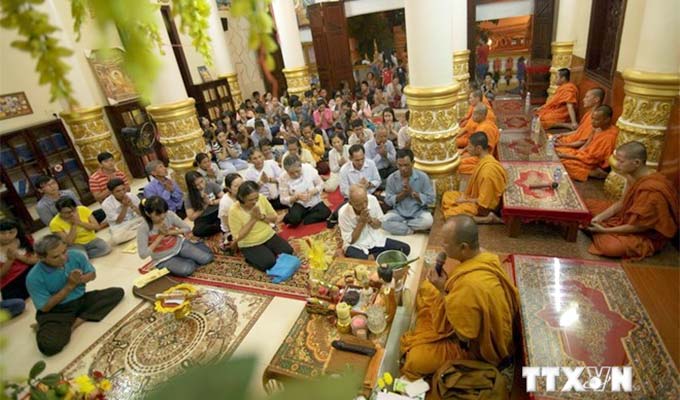Officials of the Mekong Delta province of Soc Trang have arranged a series of activities for local Khmer ethnic people to celebrate their traditional Sene Dolta festival.

Khmer ethnic people to celebrate their traditional Sene Dolta festival
Delegations of the province are paying visits and presenting gifts to 92 Khmer pagodas, esteemed Khmer people and disadvantaged households.
In addition, the celebration of 2018 Sene Dolta at Som Rong pagoda of Soc Trang city will be broadcast live on October 9.
Ly Soc Pha, deputy head of the provincial committee on ethnic affairs, said the province has enhanced infrastructure as well as provided financial assistance and seedlings to facilitate Khmer people’s livelihood.
Local people have also received technical guidance in agriculture and aquaculture to effectively apply new production models, which in turn improves their lives and reduce poverty rate, he added.
In 2018, about 79 billion VND (3.39 million USD) under Programme 135 was presented to Khmer people in Soc Trang, including 57.3 billion VND for development.
The Government’s Programme 135, launched in 1999 under the Prime Minister’s Decision 135/1998/QD-TTg on July 31, 1998, aims to improve living conditions for rural residents with a particular focus on ethnic minority communities.
A sum worth 60.6 billion VND (2.6 million USD) was allocated to disadvantaged and border communes, from which the localities have worked on total 85 constructions, including rural roads, irrigational works and communal houses.
From the beginning of the year, more than 1,500 households have gained access to electricity.
About 10,000 Khmer people in the province currently have stable jobs, which helped to lower poverty rate in the province’s Khmer group to less than 15 percent.
The Sene Dolta Festival in the late eighth lunar month is one of the three biggest traditional festivals of Khmer people, along with Chol Chnam Thmay (New Year) and Ok Om Bok (a festival to thank the Moon for good harvests).
During this festival, Khmer people pay tribute to their ancestors and take part in community celebration activities with traditional songs and dances after a hard working year.